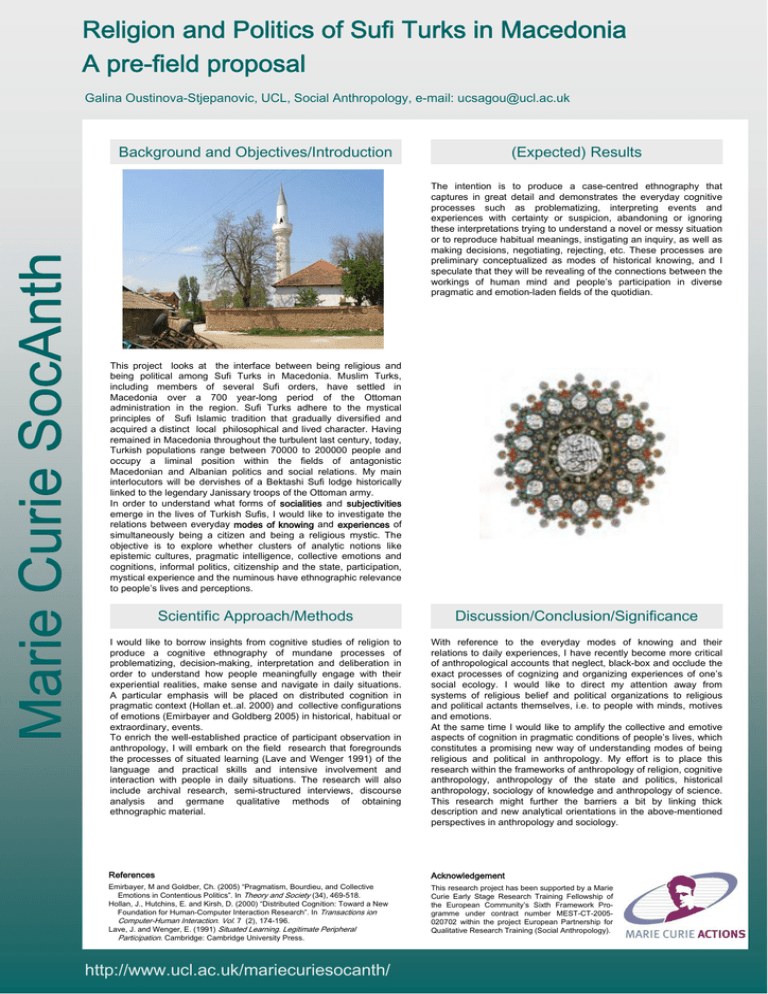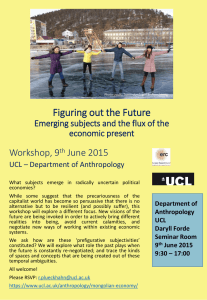Religion and Politics of Sufi Turks in Macedonia A pre-field proposal
advertisement

Religion and Politics of Sufi Turks in Macedonia A pre-field proposal Galina Oustinova-Stjepanovic, UCL, Social Anthropology, e-mail: ucsagou@ucl.ac.uk Background and Objectives/Introduction (Expected) Results The intention is to produce a case-centred ethnography that captures in great detail and demonstrates the everyday cognitive processes such as problematizing, interpreting events and experiences with certainty or suspicion, abandoning or ignoring these interpretations trying to understand a novel or messy situation or to reproduce habitual meanings, instigating an inquiry, as well as making decisions, negotiating, rejecting, etc. These processes are preliminary conceptualized as modes of historical knowing, and I speculate that they will be revealing of the connections between the workings of human mind and people’s participation in diverse pragmatic and emotion-laden fields of the quotidian. This project looks at the interface between being religious and being political among Sufi Turks in Macedonia. Muslim Turks, including members of several Sufi orders, have settled in Macedonia over a 700 year-long period of the Ottoman administration in the region. Sufi Turks adhere to the mystical principles of Sufi Islamic tradition that gradually diversified and acquired a distinct local philosophical and lived character. Having remained in Macedonia throughout the turbulent last century, today, Turkish populations range between 70000 to 200000 people and occupy a liminal position within the fields of antagonistic Macedonian and Albanian politics and social relations. My main interlocutors will be dervishes of a Bektashi Sufi lodge historically linked to the legendary Janissary troops of the Ottoman army. In order to understand what forms of socialities and subjectivities emerge in the lives of Turkish Sufis, I would like to investigate the relations between everyday modes of knowing and experiences of simultaneously being a citizen and being a religious mystic. The objective is to explore whether clusters of analytic notions like epistemic cultures, pragmatic intelligence, collective emotions and cognitions, informal politics, citizenship and the state, participation, mystical experience and the numinous have ethnographic relevance to people’s lives and perceptions. Scientific Approach/Methods Discussion/Conclusion/Significance I would like to borrow insights from cognitive studies of religion to produce a cognitive ethnography of mundane processes of problematizing, decision-making, interpretation and deliberation in order to understand how people meaningfully engage with their experiential realities, make sense and navigate in daily situations. A particular emphasis will be placed on distributed cognition in pragmatic context (Hollan et..al. 2000) and collective configurations of emotions (Emirbayer and Goldberg 2005) in historical, habitual or extraordinary, events. To enrich the well-established practice of participant observation in anthropology, I will embark on the field research that foregrounds the processes of situated learning (Lave and Wenger 1991) of the language and practical skills and intensive involvement and interaction with people in daily situations. The research will also include archival research, semi-structured interviews, discourse analysis and germane qualitative methods of obtaining ethnographic material. With reference to the everyday modes of knowing and their relations to daily experiences, I have recently become more critical of anthropological accounts that neglect, black-box and occlude the exact processes of cognizing and organizing experiences of one’s social ecology. I would like to direct my attention away from systems of religious belief and political organizations to religious and political actants themselves, i.e. to people with minds, motives and emotions. At the same time I would like to amplify the collective and emotive aspects of cognition in pragmatic conditions of people’s lives, which constitutes a promising new way of understanding modes of being religious and political in anthropology. My effort is to place this research within the frameworks of anthropology of religion, cognitive anthropology, anthropology of the state and politics, historical anthropology, sociology of knowledge and anthropology of science. This research might further the barriers a bit by linking thick description and new analytical orientations in the above-mentioned perspectives in anthropology and sociology. References Acknowledgement Emirbayer, M and Goldber, Ch. (2005) “Pragmatism, Bourdieu, and Collective Emotions in Contentious Politics”. In Theory and Society (34), 469-518. Hollan, J., Hutchins, E. and Kirsh, D. (2000) “Distributed Cognition: Toward a New Foundation for Human-Computer Interaction Research”. In Transactions ion Computer-Human Interaction. Vol. 7 (2), 174-196. Lave, J. and Wenger, E. (1991) Situated Learning. Legitimate Peripheral Participation. Cambridge: Cambridge University Press. This research project has been supported by a Marie Curie Early Stage Research Training Fellowship of the European Community’s Sixth Framework Programme under contract number MEST-CT-2005020702 within the project European Partnership for Qualitative Research Training (Social Anthropology). http://www.ucl.ac.uk/mariecuriesocanth/





